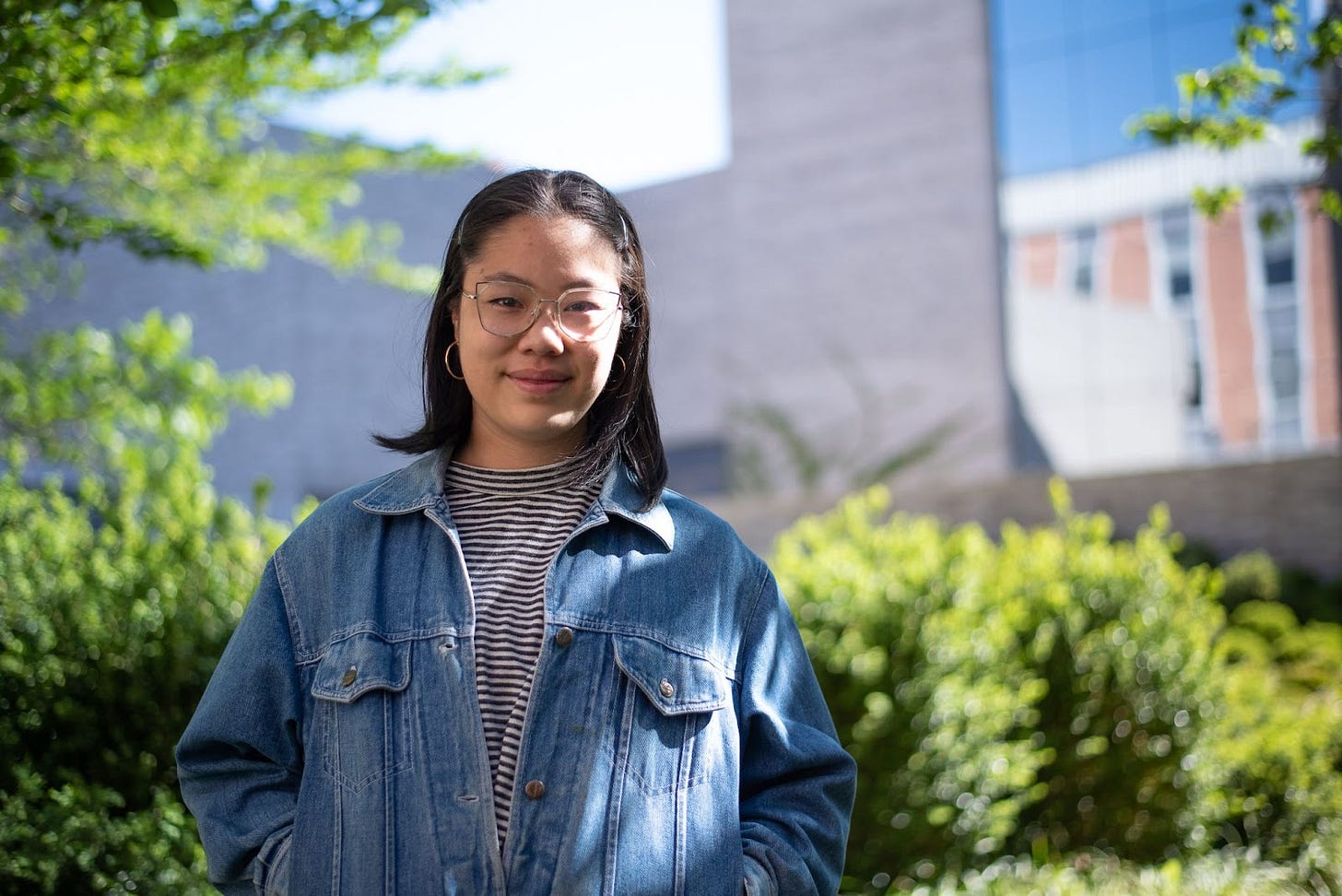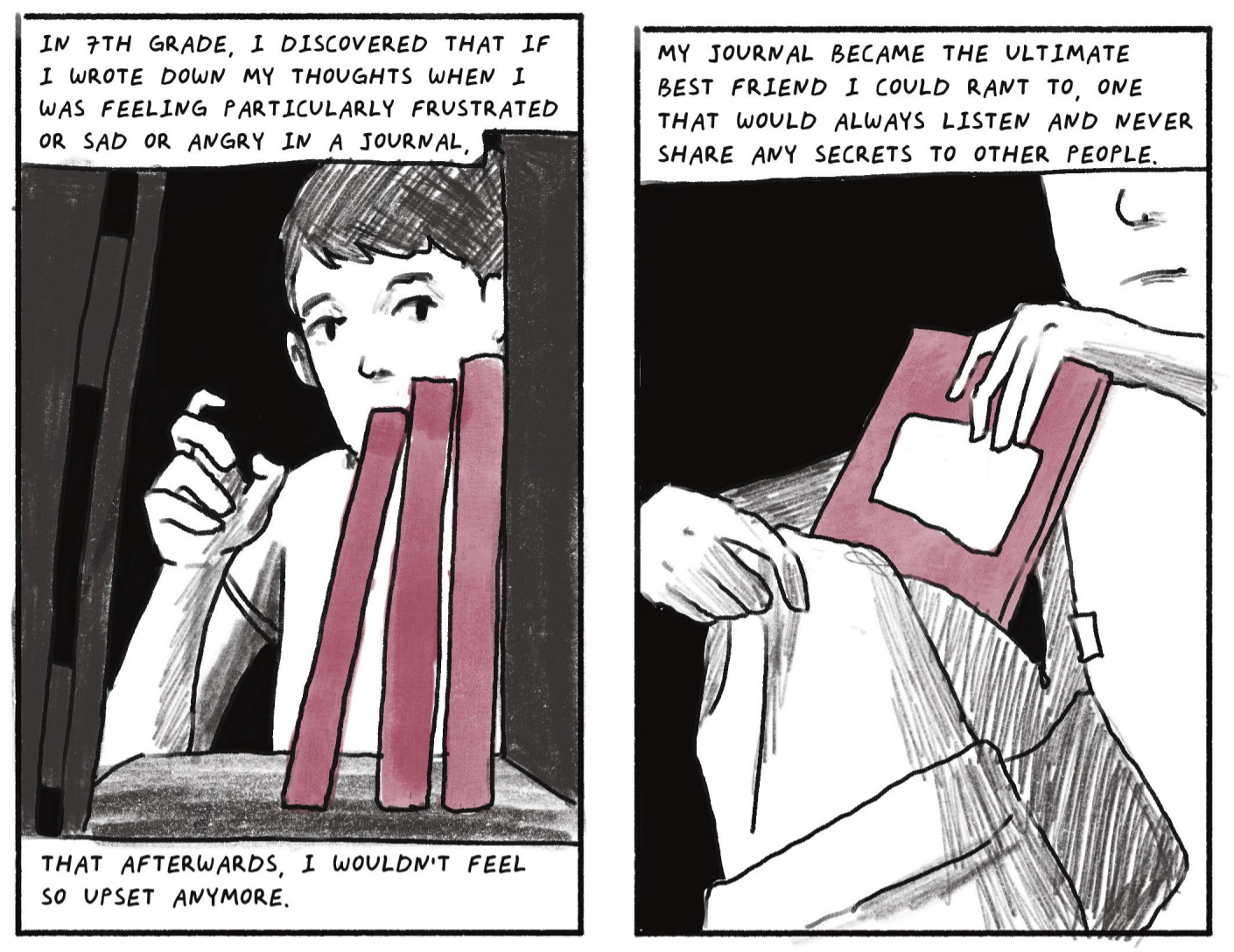Graphic Memoirs with Wendy Ho
Rereading old journal entries, Leaning into labels to feel more solid in a personality trait or identity, and Leveraging drawings to convey detail otherwise lost in text
Wendy Ho is a recent graduate of Princeton University and a Program Manager at Microsoft. In her free time, she likes to draw, read, and hike. To stay posted on her work in making comics, you can follow her on Instagram.
Photo credits: Felicity Audet
We would love to hear about your journey. How did you initially get into graphic novels? How has the journey been since?
I initially got into making comics after coming across web comics that were posted on Tumblr in middle school. Something about the visual format really appealed to me. I think it’s because images can also include other details in a moment that words can’t always convey. In high school, I read ‘Fun Home’ by Alison Bechdel, which is a graphic memoir about her complicated relationship with her father. The book talks about a lot of serious and complicated themes, like her father’s suicide, her own coming out, and difficult moments in childhood. After reading the book, I realized that comics aren’t just for superheroes or fantasy plotlines, but can also help to tell stories that can be hard to write about. Freshman year, I made a short mini-comic on social media about how lonely I felt in my first semester at Princeton. I really just wanted to express that while there were a lot of great things about college so far, I still felt super alone after my first semester, and couldn’t help but to feel a little disappointed.
After I shared my mini-comic online, a lot of people reached out to me, both from high school and from Princeton that I didn’t know that well yet. I started to realize that making comics was not only cathartic for me, but could also help people relate to a specific experience I was having, and hopefully make them realize they weren’t alone in their own feelings.
This past year, I started writing for the Daily Princetonian and became an Assistant Editor for the comics section. It was a really rewarding experience, and I loved thinking of what to write about and what visuals would pair with what text. So, when I came across my journals from middle school, I thought it would be a perfect project to take on as a graphic novel.
Why did you choose to translate your journal (textual) into a graphic novel (textual and visual)?
I chose to translate my journal into a graphic novel because I feel like whenever I write about the personal, it helps to draw it out too. I liked the idea of including drawings of specific moments from my journal, like the way my dad’s car looked or the way my high school hallway looked. These are all pretty small background details, but I think it helps me put a location to a memory I want to write about. I think I’ve also always been more of a writer/illustrator. My journal from middle school is half filled with drawings and half filled with text.
What do you spend your time on these days? What’s top of mind?
This summer, I’ve been spending my time working on the graphic memoir, catching up on sleep, and hanging out with friends. At the start of the summer, I had a lot of grand ambitions of how much I would be able to get done in terms of personal creative projects I didn’t have time and energy for at Princeton. But it turns out that I actually spent most of my time hanging out with friends from high school (a few of which I hadn’t seen since the pandemic began or since graduation) and getting more than 8 hours of sleep. I think a younger version of myself would see that as a failure, since I didn’t get as much as I wanted to get done. But I think now I’m able to see what a gift just resting and connecting again with people is. Soon, I’ll be starting my job at Microsoft, so I’m sure my day-to-day life will change a lot, but I hope to keep some of what I learned this summer about not being too hard on myself and taking things slowly.
What was the inspiration for writing a graphic memoir? Tell us about the cover graphic.
As I talked about before, one of my biggest inspirations is ‘Fun Home.’ Alison Bechdel actually came to Princeton to speak my sophomore year, and it was so cool hearing her speak! The cover graphic is a temporary holding page for now. I think I will change it as I get further along. But for now, I chose to take the panel of me sitting in my dad’s car and make it the cover. I just have a lot of strong memories associated with my dad’s car, since he drove me to school all throughout middle school and high school.
What was the process of rereading your journal and translating it into a graphic novel?
The process of rereading my journal was actually more healing than I thought it would be. I thought I would cringe at what I wrote about, since I feel like it’s really easy to be embarrassed by your younger self. I mean, sometimes I look at things I was obsessed with as a kid and what I wore, and I can’t help but to cringe a little. But, after reading the journal entries, I was kind of struck by how some of the same issues I talked about then, I still kind of grapple with now. It helped me to realize that I’m kind of the same person, in a good and bad way. Translating it into a graphic novel is a pretty labor intensive process, so I’ve just been spending a lot of time thinking about the past. It’s also kind of strange since I am writing about something so personal, but I do want to share it with an audience. I certainly don’t think my 14-year-old self thought that what I wrote would be shared with anyone. It is very scary sharing something as personal as my journal entries with others, since it is easy to view their judgement of the graphic novel as a judgement of myself. I have also had to separate myself from the graphic novel to an extent too.
Why do we as humans have such an obsession with categorizing ourselves? I too have considered the question who am I, really?
Haha, I’m not sure why we are so obsessed with categorizing ourselves! I just think that labels can sometimes help us see who we are. I mean in the LGBT+ community, some people identify really strongly with a particular label, while others prefer no label or just an umbrella term ‘queer.’ Personally, I think having a label helps me to feel more solid in a personality trait or identity. But I can also see how it is limiting. For instance, I really saw myself as a shy kid growing up, but I think now I’ve started to challenge that a little more and take steps to grow past and manage anxiety I have in social situations.
How do you answer this question now? And how has that answer changed over time.
I’m not sure actually! I kind of just do whatever appeals to me. I can definitely list parts of myself that feel pretty inseparable from my core identity, like being Asian-American or bisexual. But there are also personality traits and hobbies I identify strongly with that will probably change over time and life circumstances.
I am really touched by how you prioritize giving yourself grace. Was there a moment you came to this realization?
I think giving myself grace is one of the harder lessons I’ve had to learn at Princeton. Being really tough on myself is how I was able to do so well in high school. But after getting to Princeton, no matter how hard I was on myself, I was never able to do as well in my classes compared to how I was in high school. So I’ve really had to learn that it was okay not to do well and that there are so many ways to get that sense of achievement and self-satisfaction that don’t come from things that are external, like getting a good grade or internship or becoming president of some club.
What advice would you give to those of us who want to journal more?
Good question! I kind of view my journals as a way to process my thoughts. So when I have a lot of thoughts, I tend to journal more. I mean I probably have written more during the pandemic than I have in the last 5 years before that! I guess my only advice is to think of journaling as a way to think through what you’re feeling and organize your thoughts. Though I mean, people journal for a variety of reasons too! This is only what I use my journal for.
If you were not working as a PM at Microsoft, what would you be doing?
I’m not sure actually! I think it could be cool to be a travel blogger and write about different places and really highlight the histories of each place. When I was studying abroad in Singapore before the pandemic, I traveled around a lot and kept a blog about my travels. I thought that was pretty fun, and wouldn’t mind if that was my life. I also was kind of struck by the fact that there were a lot of mostly white tourists from Western countries at many of the locations, but there was never really any deeper engagement with the culture or history of the place besides trying new foods and exploring different monuments. I think it could be cool to have a travel blog that highlights places to visit and foods to try, but also explores deeper into the history of a place and how it might also be tied to legacies of colonialism. I also think it could be really cool to be a film director or storyboard artist! I don’t quite know, but I just find a lot of different things interesting.
Obviously one cannot predict the twists and turns of the future, but 10 years from now from the perspective of today - what do you want to be doing?
I don’t know what I want to be doing, but I hope that 10 years from now I will have made some kind of impact in an area I care about. I think that can look a lot of ways. For instance, maybe I can be in charge of a specific new feature in a product line in tech that helps people. Or maybe I can work on a film or book that people can relate to. Or honestly, even just volunteering at a place for 10 years can have a huge impact. I just hope that whatever I do in 10 years will have some kind of impact and that I can help people feel less alone.
Do you have any advice for your younger self?
Be kind to yourself! Also, let yourself be open to people!
Readers, be sure to check out Wendy’s visual essay: What training for the National Suicide Prevention Lifeline taught me







